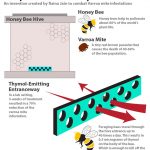
Printable edition
- President’s Message, November 2020
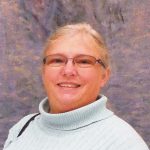 As I sit in my study this morning, I am attending the 2020 National Honey Show from outside of London. I've dreamt of going to this show for years, watching speaker videos on YouTube, and wanting to wander the aisles of this competitive and incredible honey show. So, for the next three days I plan to be up and on the computer by 6am, attending this show via the internet. Unfortunately, I cannot see the live honey show, but can still participate remotely.
As I sit in my study this morning, I am attending the 2020 National Honey Show from outside of London. I've dreamt of going to this show for years, watching speaker videos on YouTube, and wanting to wander the aisles of this competitive and incredible honey show. So, for the next three days I plan to be up and on the computer by 6am, attending this show via the internet. Unfortunately, I cannot see the live honey show, but can still participate remotely.Well, I don’t have to tell you that 2020 has been very different for all of us. For new beekeepers, it is certainly harder to meet with the experienced members of the local clubs and ask advice. Newcomers: take the initiative, reach out to club members yourself. Ask members to talk bees with you, or see your hives. Do what it takes to become part of the beekeeping community.
Clubs are adapting. One nice change is the transfer to the use of Chalkboard and Zoom for monthly club meetings, all done safely through the internet. I have been able to attend meetings and listen to some incredible speakers, though I deeply miss the synergy of a face-to-face meeting. I long to just sit around and talk bees with other beekeepers. The exchange of knowledge at those times is credible. I belong to four county clubs (in addition to MSBA) and appreciate every one of them. I suggest you consider reaching out to additional clubs in the counties surrounding your apiaries
As we take account of our year in beekeeping, I am finding that I've worked my bees more regularly, but in smaller chunks of time. My hive records are some of the best we have ever had… still almost complete! 75% of our honey has been bottled, and is on its way to other homes and stomachs. Our honey was lighter in color than usual less Tulip Poplar red-brown honey was pulled. We worked with mentees regularly, but everyone stayed veiled. Hands-on experience makes a difference.
As for MSBA, please thank our volunteers who keep the state club moving. Check out our webpage: the webmaster, Phil Frank has been adding content, and making it easier to maneuver. Phil keeps a calendar on the webpage, so please add your local club's meeting times if they are not listed.
Meanwhile, if any Maryland club is willing to welcome other beekeepers from MSBA to attend their local club Zoom meetings, please consider sharing your meeting information with MSBA for distribution throughout the state. Most Zoom license allow up to 300 attendees. Don’t let those learning opportunities be wasted! Contact me or Maureen Jais-Mick who manages our email communications. Members, watch for MSBA notices from Maureen delivered directly to your email account with learning opportunities such as lectures or classes. For educational outreach, the Bee Squad at UMD will be working with MSBA to offer more class/lecture opportunities over the next months.
November is when we look back on the last beekeeping year, and plan how we will do things differently next year. I ask each of you to set a goal to become involved in your beekeeping community. Volunteer to take on a job in your club, consider mentoring a new beekeeper and letting them work hives with you. We need each other to be successful.
Meanwhile if you have an idea for a class you want MSBA to host, please contact me directly. I welcome the input.
by Kim Mehalick
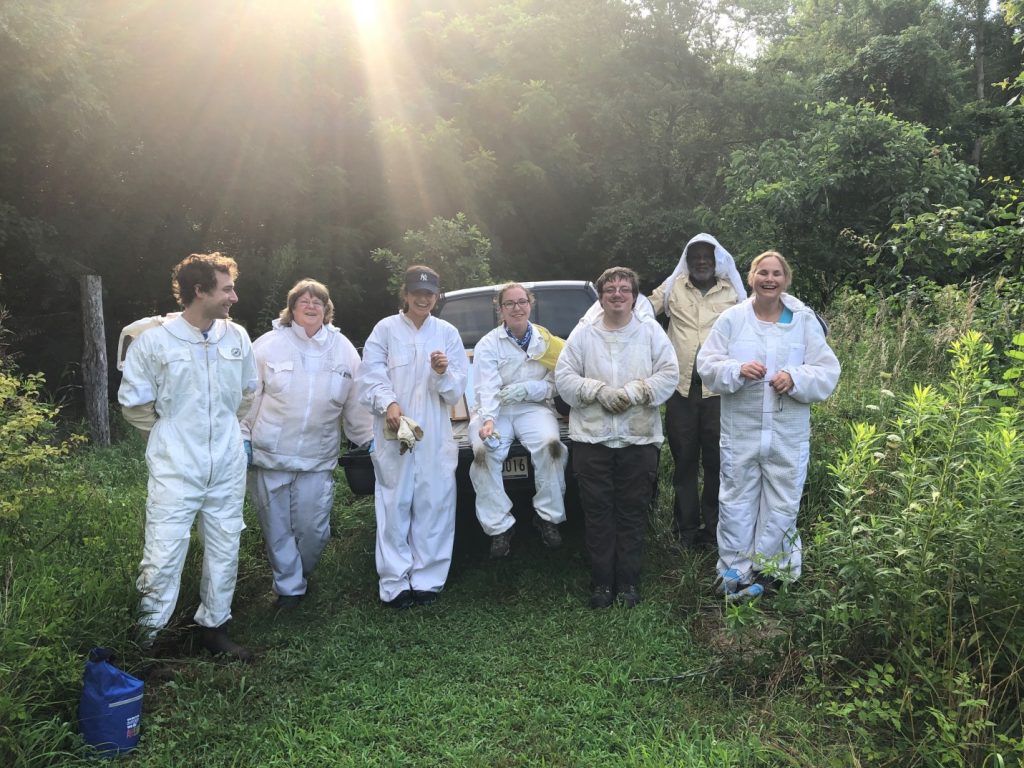
Pulling Honey supers at 7:30 am. What a joyful group of new beekeepers (veils on except for this photo): my favorite shot of 2020
- Notes from the Apiary Inspector
Cybil Preston, State Apiary Inspector, MDA
Phone 410-841-5920, Fax 841-5835, Cell 410-562-3464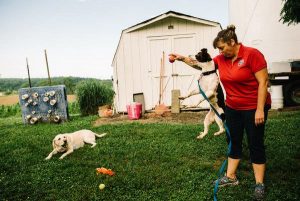
The Summer drought in most of Maryland was fairly short. The rain later in the summer helped push a really good goldenrod flow. Goldenrod could be seen all over– on roadsides, field edges, meadows! It was wonderful to see so much of it in bloom. The smell emanating from the colonies was wonderfully pungent.
I am seeing a considerably lower number of "Fall Crash" or "Fall Dwindle" colonies. I think it is mostly because the bees experienced a decent Fall nectar flow, and also beekeepers were more aware of and anticipated the monitoring and subsequent treatment of varroa mites and varroa/viral issues. If you are treating your colonies for varroa mites, please do a mite count prior to and after use of your varroa control to ensure efficacy of your varroa control. Also if you have a very strong colony still rearing large numbers of brood, a second mite treatment may be needed if the first treatment only brought the mite numbers down to threshold.If you have strong colonies that are robbing weaker colonies, they can reinfest themselves with varroa from the weak colony. Another thing to check for after the varroa treatment is the brood pattern before and after. Some varroa treatments can cause brood death and you also want to be sure the queen is still effective after your varroa control has been removed. Check for eggs and young larvae to ensure that your colony is still queenright.
Other pests... NOT Murder Hornets! Calls and emails are still coming in to the MDA for sightings of what people think is the "Murder Hornet." We do not have the Asian Giant Hornet here in Maryland and we are continuing to monitor for it. European Hornets are still an issue for beekeepers, however. They have been in higher numbers this year and will pick the honey bees right out of the air or right off the colony. Their. impact is seemingly worse in apiaries that have had to do supplemental feeding. Make sure to reduce your entrances especially if you are feeding.
Field Watch/Bee Check: This Voluntary beehive mapping tool is going strong. There are more beekeepers registered than any other crop.
Thank you to all the beekeepers that participated in the USDA/APHIS National Honey Bee Survey. We got a really late start due to the Covid-19 shut down and new protocols... BUT we were still able to sample 13 sites a single time, and 5 sites received dual sampling. AGAIN Thank you to all who were willing to participate. Anyone willing to participate in 2021, please let me know. You must have 8 colonies to qualify. I appreciate your willingness to participate!
Mack & Tukka: We are currently just back into our training routine bringing the "Boys" out of vacation mode. We are working on scenting and stamina at the moment. Maryland's AFB dogs will be back into their inspection routine soon. We will work on commercial beekeepers moving to California first.
Happy Fall and keep on ZOOMING!
- Dr. Barry Thompson Wins Divelbiss Award
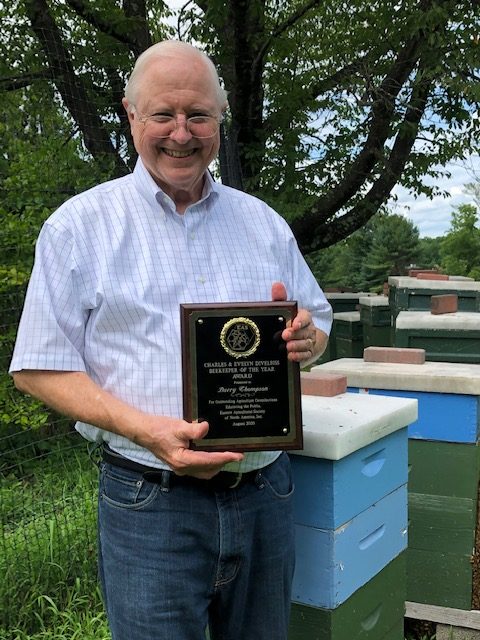
Dr. Thompson received his award at home, seen here in that apiary. Maryland beekeeping’s very lucky several decades with Dr. Barry Thompson in our community, it is difficult to imagine a way to educate, serve, support, and mentor which he has not embraced and at which he has not excelled.
For 65 years, both within our ranks (as an association leader, teacher, mentor, and former President of MSBA) and to the public via innumerable talks, media interviews, volunteer sessions at State and county fairs, Rotary Club, garden, church and school groups (in multiple languages), Dr. Thompson has missed no opportunity to share his unparalleled understanding and passion for beekeeping…to the great benefit of both people and bees.
As an EAS Master Beekeeper since 1996, he has richly fulfilled the program's mission to provide education and assistance to beginning beekeepers and serve in other capacities in the community as experts in beekeeping.
For example, many Maryland beekeepers might not be aware that in 2007, Dr. Thompson successfully petitioned the state to join with 20+ others in proclaiming National Pollinator Week. He has been a delegate to NAAPC since 2002 and has leveraged his distinguished medical career to give talks on bee stings and other topics for associations in many areas.The Eastern Apicultural Society recognized this lifetime of study, service, and education this summer by presenting Dr. Thompson with the Charles and Evelyn Divelbiss Education Award. As EAS explains, "This award is presented to that person or couple who has—over a period of years—reached out to the non-beekeeping public to explain the value of honey bees in our lives.” In the words of the EAS Journal, he has been "a constant and enthusiastic ambassador for the honey bee” though high school, college and an exceptionally well-led life.
The Divelbiss Award was established in 1988, as recognition of the importance of public outreach in addition to EAS’ other major recognitions: The James I. Hambleton Memorial Award for research excellence in apiculture (which went to Cameron Jack of the University of Florida), and The Roger A. Morse Outstanding Teaching/Extension Service/Regulatory Award, which went to our own Karen Rennich! The Hambletonian Award celebrates our quest to better understand the miraculous honey bee, the Morse Award encourages us to build our skills and understanding as beekeepers, and the Divelbiss underscores the importance of creating a world where honey bees can be understood, accepted and thrive in their millennia-old partnership with human beings.
More personally speaking, I remember receiving a concerned phone call when I posted in our club’s online forum about receiving a large number of (richly deserved) stings. Dr. Thompson, it turns out, was always out there, paying attention, teaching, and caring for the community, with time to check in on individuals and make sure we got good advice in both tough and hopeful spots. We have been unbelievably enriched by his presence among us, and no award was more richly deserved. - 2020 November 07 Meeting
The Fall Meeting Will Be A LIVE Webinar -- including Elections!
WHAT: Keynote Speaker Randy Oliver
KEYNOTE TOPIC 1: Reading the Combs
KEYNOTE TOPIC 2: Understanding Varroa
DAY: 11/07/20 Saturday, November 07, 2020
TIME: 9AM- 1:00PMDESCRIPTION: Half-day, online-only meeting of the Maryland State Beekeepers Association. Limited to 500 participants. Admission is Free (and so is parking!)
TIME EVENT 9:00am Opening and Welcome, Kim Mehalick, MSBA President 9:15am Reading the Combs: Understanding Bee Biology Over the Course of a Season, Randy Oliver-Scientific Beekeeping 10:15am Maryland Apiary Inspectors Report, Cybil Preston, State Inspector, Maryland Department of Agriculture 10:40am UMD Bee Squad Update on Recently Completed Varroa Treatment Study, Mark Dykes, Coordinator, University of Maryland Bee Squad 11:05am Annual Elections, MSBA Nominations Committee
Online!11:30am Understanding Varroa and Its Management, Randy Oliver,
Scientific Beekeeping12:30pm Q & A Session The 2020 Fall Meeting will not include a Honey Show because we cannot safely meet face to face at the present time.
Speakers:

Randy Oliver
Scientific Beekeeping* RANDY OLIVER of http://scientificbeekeeping.com will present two talks:
READING the combs: Understanding bee biology over the course of a season. By acquiring a better understanding of the biology of bees, nutrition, parasites, and pathogens over the course of the season, and by learning to "read the combs," the beekeeper can make better management decisions adapted to his/her particular situation.
UNDERSTANDING varroa and its management: The varroa-virus complex is the number one problem for beekeepers. See how Randy manages varroa both inexpensively, and without synthetic miticides.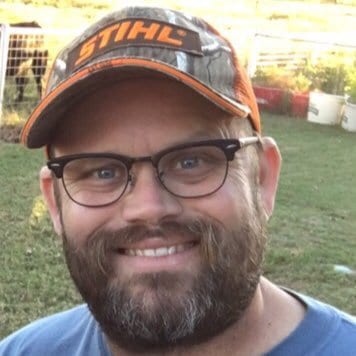
Mark Dykes
UMD Bee Squad* MARK DYKES of The Bee Squad will present finding of their new study that compares post-honey-harvest Varroa treatments here in Maryland.
Apivar was the winner. You can see the Bee Squad's description of their research in a .pdf file attached HERE. Their results are in a .pdf file attached HERE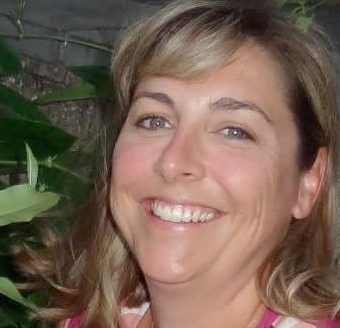
CYBIL PRESTON
MD State Apiary Inspector* CYBIL PRESTON, MD State Chief Apiary Inspector will give an update on Maryland's bees.
* Elections for the MSBA leadership will occur during this online meeting. Participate to make sure your voice is heard!
ZOOM INFO
To Participate in the Meeting, all you need to do is click this orange button at 8:50am Saturday, Nov 7th:
Zoom Experts may prefer to join manually: link: http://umd.zoom.us/j/96393140626 Meeting ID: 963 9314 0626 -- or -- Ph. 301 715 8592 Meeting ID: 963 9314 0626
WHAT is a WEBINAR and HOW DO I WATCH IT???
This Zoom webinar is accessible via your computer (smartphone or tablet). To 'attend' via computer only requires three clicks:
- 10 minutes before the meeting starts, click the ZOOM LINK listed above
- When your computer asks, click "open zoom.us.app"
- When your computer asks, click "join with computer audio" (this lets you HEAR the webinar. Please keep your microphone muted.)
You can join using a computer, phone or tablet, but to use a phone or tablet you must first download and install the free Zoom MEETING app from the app store, or by clicking HERE.
Connecting to ZOOM before the meeting starts will give you time to work through potential glitches.
To ASK QUESTIONS during the meeting:
TYPE them into the Q&A chat dialog. A club volunteer will monitor questions, then read them aloud so everyone can hear. Please don't 'unmute' your microphone during the meeting.
- Morse Award Recognizes Karen Rennich


Dr. Roger A. Morse, 1927-2000 Maryland beekeepers have known for a while of our great fortune to have premier research and educational institutions and extension in our state. Luckily, The Eastern Apicultural Association has recognized this excellence as well, presenting Karen Rennich, the founding Executive Director of the BeeInformed Partnership with the The Roger A. Morse Outstanding Teaching/Extension Service/Regulatory Award. The Morse Award is supported by Anita Weiss Foundation, includes a $500 premium, is given annually to recognize an individual in teaching/extension and/or regulatory activity in the field of apiculture. This award was founded in 1999 as a memorial to Dr. Roger Morse of Cornell University, who pioneered today’s Master Beekeeper Program. Dr. Morse was also an illustrious researcher, author and educator, held in great esteem by generations of scientists and citizen beekeepers.
Karen joined the beekeeping world in 2009 after an earlier career in ocean engineering at the Johns Hopkins Applied Physics Laboratory, and since 2010 has been instrumental in the creation and leadership of the BeeInformed Partnership, a non profit headquartered at the University of Maryland. She recently stepped down as Executive Director and now is excited to be more involved in many of the research and extension projects at the UMD Honey Bee Research Lab. She acknowledges that the best part of creating The Bee Informed Partnership was the development of the team and getting to work with so many talented and inspirational beekeepers nationwide.
As Karen herself describes BeeInformed and her work there, “The main idea ...is to get information collected from beekeepers back to beekeepers quickly so they can make more informed decisions. We collect information using online surveys and field collected information from tech teams.” After collection, she says, “we summarize and analyze the data using epidemiological methods and return the data back to beekeepers quickly. Our ultimate goal is that beekeepers, using this information, will reduce the number of colonies they lose.”
This is the heart and soul of education and extension work, a role which Karen has performed with grace, good humor, and insight for the past ten years.
There are three major EAS awards each year. In addition to the Morse Award, the Divelbiss Award was established in 1988, as recognition of the importance of public outreach. This year, the Divelbiss went to Maryland’s own Dr. Barry Thompson! The James I. Hambleton Memorial Award for research excellence in apiculture went to Cameron Jack of the University of Florida. If the Hambletonian Award celebrates our quest to better understand the miraculous honey bee, the Morse Award encourages those who help us to build our skills and understanding as beekeepers. It is a crucial link from the lab to the apiary, and we are so very fortunate to have this marvelous practitioner among us! - Mission Beelieve: Heroes for Honey
Beekeeping training for Veterans and First Responders
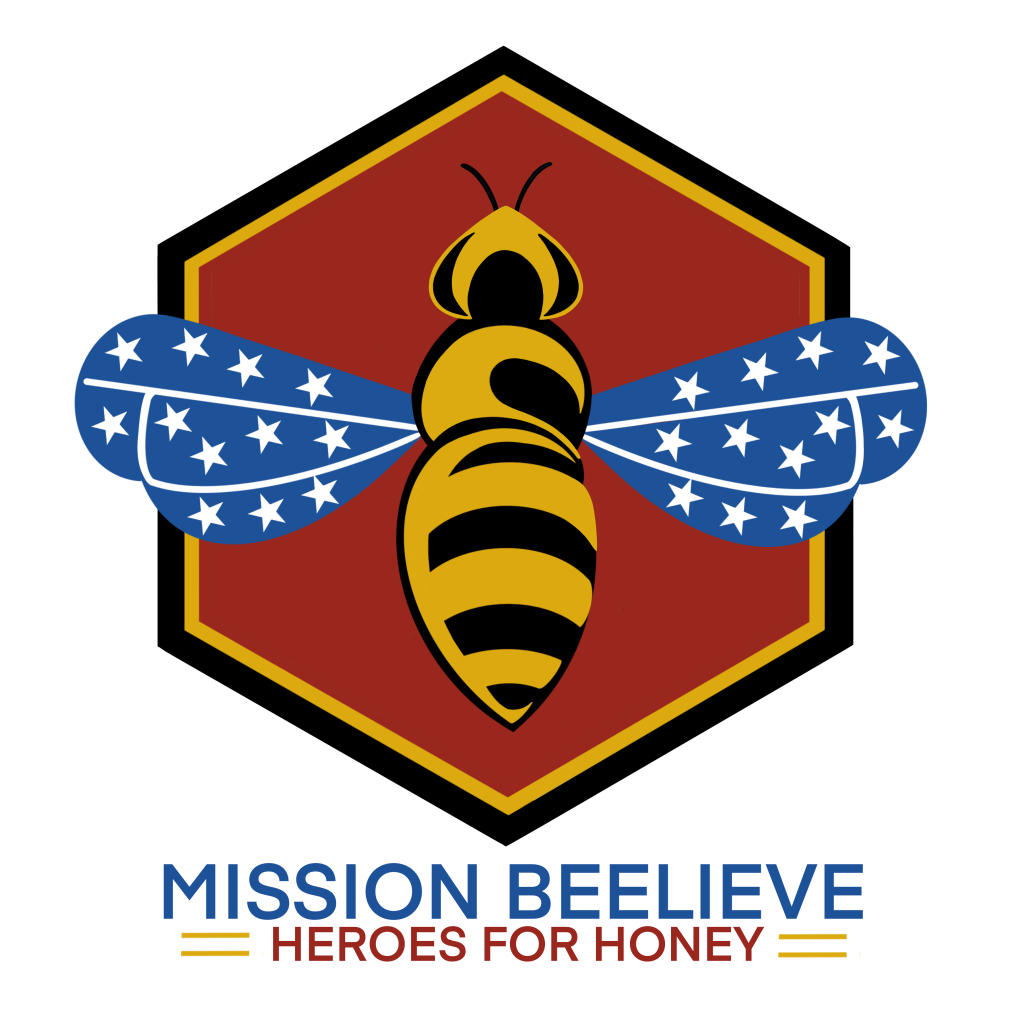
Based in Westminster, Maryland and co-created by MSBA Member Monica Schmitt and her son Tristan Bannon, local non-profit organization Mission Beelieve seeks to serve those who have put themselves in harm's way for us: veterans and first responders. Among key goals: to help returning service members with the transition to civilian life and suicide prevention, and to provide healing through beekeeping.
To do this, Mission Beelieve provides a beekeeping education for local Veterans and First Responders. According to the group, "Our goal is to create a relaxing environment, while educating about the vocational aspectsof beekeeping. This program gives a sense of purpose and a way to reconnect with the community."
There are several ways to participate in Mission Beelieve. "Partners" can apply for training and mentoring in a therapeutic setting. "Mentors" have the opportunity to bring a newbee into your apiary or Mission Beelieve's Training apiary.
"Mentors are required to have at least two years of beekeeping experience and a successful over-winter. They should also carry a passion to bestow their beekeeping knowledge to our next class of beekeeping heroes."
Mission Beelieve also welcomes "Volunteers," understanding that not all of us are in a position to commit to mentoring. Volunteers can apply in any field that appeals to them or in which they have expertise. Even for non-beekeepers, there will be tasks and events to apply for throughout the year. including honey filling, craft making, woodworking, and many more options.
The organization also welcomes donations, including donations of equipment, such as safety gear, woodenware, smokers, and more. Financial donations allow them to welcome more veterans into the program.
Monica herself mentions that by "sharing her knowledge and passion with those that made the ultimate sacrifice, Veterans and First Responders, she hopes to touch as many of these heroes as possible, giving them a renewed sense of purpose."
- Beekeeping News and Notes: November 2020
No Murder Hornet Nest Was Located in Washington State (...but a Giant Asian Hornet one was)
On October 24, the Washington State Department of Ag Tweeted "Got 'em!" when they vacuumed several pounds of Asian Giant Hornets, unfortunately called "Murder Hornets" in the press, from a property in Blaine.
The department employed radio trackers and trappers to find and follow the hornets back to their nest, which was wrapped with plastic and then vacuumed clean by entomologists wearing super bee-suits.
Pittsburgh Airport beekeepers receive environmental award

4,000,000 bees fly with the big birds in Pittsburgh
In October, the Pennsylvania Department of Environmental Protection and Gov. Tom Wolf recognized Pittsburgh International Airport (PIT) with a Governor’s Award for Environmental Excellence for its airport apiaries.
The apiary, started by Master Beekeeper and local favorite Steve Repasky, began with a swarm catch on a Delta Airlines departure in 2012 and now includes 9 apiaries with around 110 colonies. In addition to Repasky’s work, PIT monitors the apiaries closely, with help from a USDA biologist, and has partnered with local research groups and universities to provide data and conduct research on swarms and promote honeybee health.
Scientists “Scent Train” Honeybees to Boost Sunflower Seed Production
A team led by Dr. Walter Farina of Universidad de Buenos Aires has found that it may be possible to enhance the pollination efficiency of honey bees by giving them a crash course in the scent of the target crop.
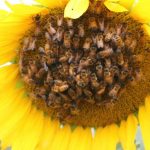 Their findings show that honeybees given food scented with odors that mimicked sunflowers supported a significant increase in sunflower crop production. “We show that it’s possible to condition honeybees to a rewarded odor inside the colony, and this experience modifies the bees’ odor-guided behaviors later,” says Dr. Farina. “The most surprising and relevant result is that the foraging preferences for the target crop are so prolonged and intensive that it promoted significant increases in the crop yields.”
Their findings show that honeybees given food scented with odors that mimicked sunflowers supported a significant increase in sunflower crop production. “We show that it’s possible to condition honeybees to a rewarded odor inside the colony, and this experience modifies the bees’ odor-guided behaviors later,” says Dr. Farina. “The most surprising and relevant result is that the foraging preferences for the target crop are so prolonged and intensive that it promoted significant increases in the crop yields.”The bees’ training led them to visit sunflowers more. Those trained bees also brought more sunflower pollen back to the hive. This increased visitation and foraging on sunflowers also boosted the flowers’ production of seeds by 29 to 57 percent.
“Through this procedure, it is possible to bias honeybee foraging activity and increase yields significantly,” Farina says. “In other words, pollination services might be improved in pollinator-dependent crops by using simple mimic odors as part of a precision pollination strategy.”
The researchers say they are now studying other pollinator-dependent crops, including almonds, pears, and apples. Ultimately, their goal is to develop an array of new odor mimics to improve pollination efficiency and productivity of many important agricultural crops.
Will Putting Honey Bees on Public Lands Threaten Native Bees?

Hives in in Uinta-Wasatch-Cache National Forest
As suitable sites become scarce, commercial beekeepers are increasingly moving their hives to U.S. public lands. But scientists warn that the millions of introduced honey bees pose a risk to native species, outcompeting them for pollen and altering fragile plant communities.
In July, the conservation group "Center for Biological Diversity" petitioned the US Forest Service to slow down the pace of approvals for managed honey bee colonies on national forest lands, citing data that "a single honeybee apiary of 40 hives consumes enough pollen in one month to feed more than 1.3 million native bees."
Some bee experts argue that no amount of honey bee hives is safe on public lands. A 2016 study published in the journal Conservation Letters found a single honey bee hive extracts enough pollen in one month to rear 33,000 native bees. If this figure is multiplied across apiaries with 100 hives, such as what is permitted in some national forests, entomologists say it could imperil the ability of wild pollinators to sustain their populations.
But as scientists study and conservationists debate the ecological impact of these honey bee introductions, commercial apiarists say they have no choice but to use public land.
“I lose yards every year because a subdivision is going up,” said Cox, a fourth-generation beekeeper who parks 592 of his 5,700 hives on national forests northeast of Salt Lake City each summer.
“We are running out of land,” he added. “We’ve reached the carrying capacity for managed bee hives in the U.S. — without access to public lands our livestock could be in peril.”
"Honey Authenticity Project" Raising alarms
A group called The Honey Authenticity Project
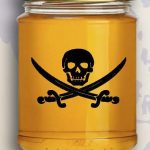 has been circulating a PDF that raises concerns about the purity and safety of honey imported into the United States.
has been circulating a PDF that raises concerns about the purity and safety of honey imported into the United States.Claiming that "Honey is the world's 4th most faked food, the Honey Authenticity Project aims to provide information and independent testing of commercially available products. Real honey is a pure and natural product that is protected with both a legal and scientific definition. It is troubling that consumers are unknowingly consuming adulterated products."
To combat "honey laundering," the group proposes a product logo program which certifies that honey for sale has received tests for purity and safety and other protocols to protect both bees and hive products.
Hope for the Future: 17-year-old creates unique varroa treatment approach
Many of us have had the experience of those closest to us finally understanding how bad varroa really are, and trying to brainstorm solutions. Well, Raina Jain, a teenager from Greenwich, Connecticut, is on our side and the bees' too, and she's done a bit better than that!
Raina has created a hive entryway that deposits small amounts of thymol onto bees, aiming to kill off mites while not harming bees, honey, or wax. Each day a forager will go through the entryway about 40 times. Each pass replenishes the thymol. In a lab setting, she discovered that the varroa mite population dropped by 70% after three weeks.
Her project was inspired by the work of Dr. Samuel Ramsey, and enlisted volunteer beekeepers in California, Connecticut, Florida, Georgia, Nevada and Rhode Island.
- EAS 2021 in Massachusetts: “Past, Present and Beeyond”
The Eastern Apicultural Society Conference for 2021 has been scheduled for July 26-30 at the University of Massachusetts, Amherst, with fingers crossed for the first chance in two years for beekeepers belonging to the largest North American beekeeping association to learn, schmooze, compete and come home better beekeepers.
The EAS Massachusetts 2021 planning committee has been working hard organizing the conference with the theme is "Past Present and Beeyond." The following key speakers have accepted an invitation to present:
Dr. Tom Seeley Dr. Sam Ramsey Dr. Tammy Horn-Potter Paul G. Kelly Erin MacGregor-Forbes Heather Mattila Bill Hesbach Scott McArt You can join the EAS at www.easternapiculture.org. It really is a great way to take your beekeeping to the next level and support a nonprofit organization whose mission is to support beekeeper education and honeybee research.
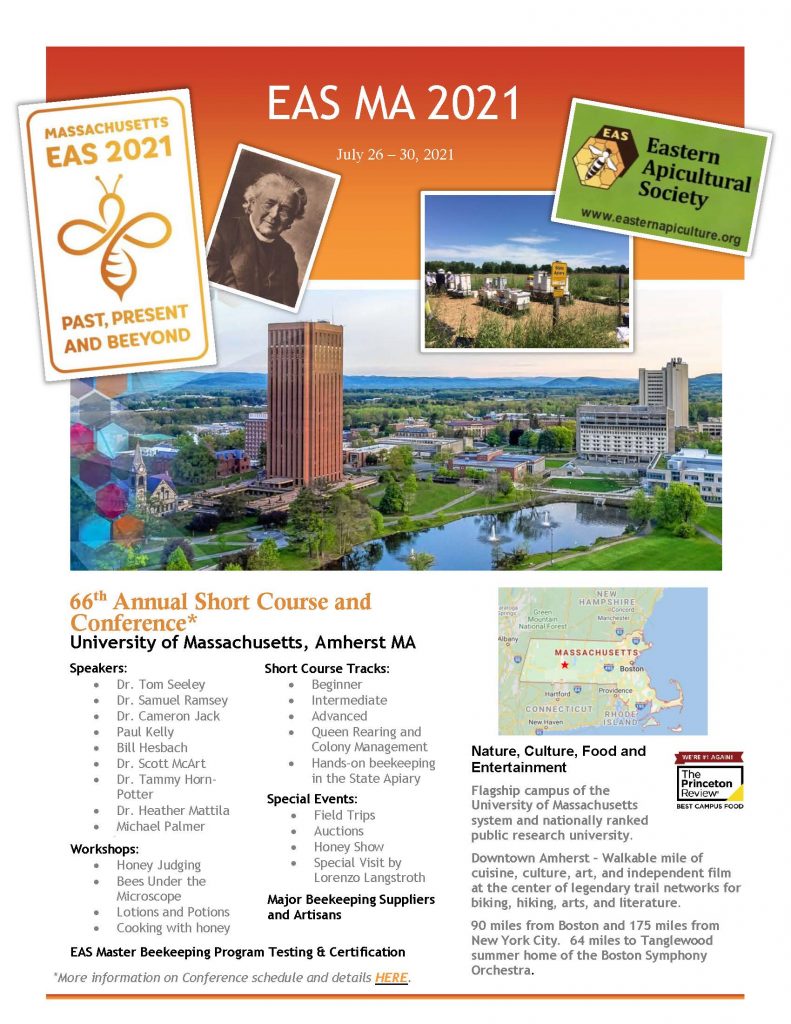
- Created Critters with Wings: a beautiful new book from beekeeper Ben Cooper

Ben Cooper has long been an important teacher, mentor and beekeeper in the Western Maryland apiculture community, as well as a member of the MSBA Board. He is also an author: he published All Nature Sings in 2018 (which of course includes honey bees) and recently published an absolutely gorgeous children's rhyming picture book, Created Critters with Wings.
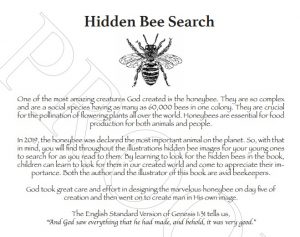 Both Ben and the illustrator, Sandy Arnold, are avid beekeepers, and each page includes hidden bees for kids to look for and find.
Both Ben and the illustrator, Sandy Arnold, are avid beekeepers, and each page includes hidden bees for kids to look for and find.You can download a PDF preview of Ben's book, and his publisher also created an educational enrichment activities book as a companion to the book. http://shinealightpress.com/shop/
Please join MSBA in congratulating Ben on yet another wonderful creative contribution to our community and the world!
- Imirie and Free State Awards, 2020
MSBA's November meeting includes the annual award of two major types of recognition to members of the beekeeping community.
- MSBA will honor honored Mr. Greg Gentry of the Washington County Beekeepers Association with The Free State Beekeeper Citizenship Award in recognition of his role in both keeping MSBA informed of issues affecting beekeepers throughout Western MD, but also being an effective channel of information back to his community from both MSBA and EAS. The Free State Award recognizes beekeepers who help boost and protect the role of beekeeping in our communities. It includes an amazing statue (pictured) to which Greg's name will be added.
- Zac Lamas, a PhD. candidate in the UMD Hawthorne Lab, will receive The George S. Imirie Education Award, which has been presented since 2003 to encourage research and continuing education for active beekeepers. The award includes an honorarium of $200 (as of this year) and recognizes his unstinting commitment to teaching and outreach through workshops and Zoom even while running a bee business, doing top level research, and enduring a pandemic!
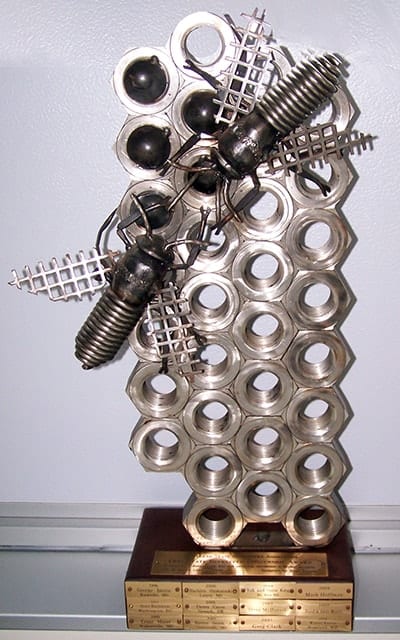
Free State Beekeeper Citizenship Award Statue


